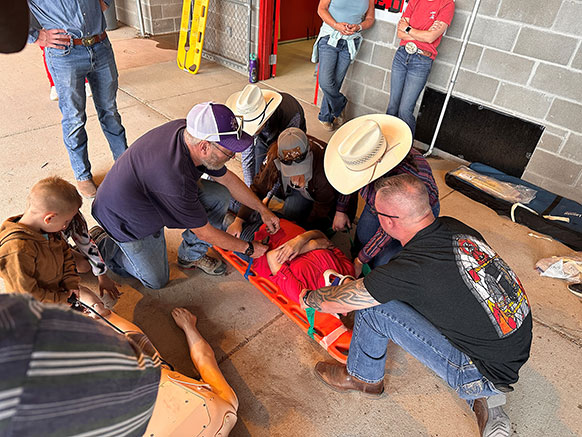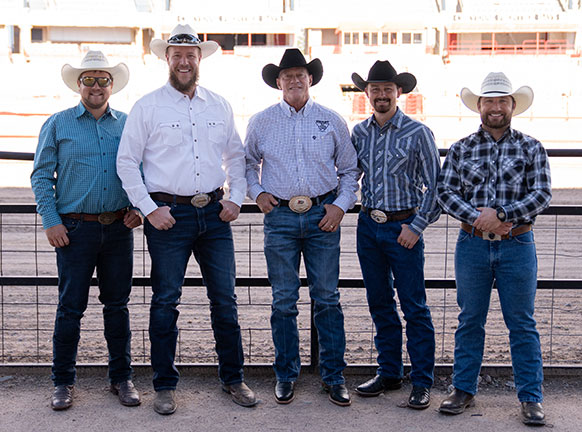UW Cheyenne Residency Curriculum Teaches Wild West Life-Saving Skills
Published October 10, 2025

Physicians with UW’s Cheyenne Family Medicine Residency Program practice rodeo medicine skills during this summer’s Cheyenne Frontier Days. (James Eggert Photo)
The University of Wyoming’s Family Medicine Residency Program at Cheyenne trains physicians
for many areas of family medicine, ranging from pharmacy to behavioral health. However,
one particular curriculum took center stage this past summer in helping resident physicians
save a life in a setting straight out of the Wild West.
Dr. James Eggert, associate program director with the Cheyenne residency program,
teaches sports and rodeo medicine, training physicians to treat injuries common to
rodeo athletes, including concussions, lacerations, fractures, dislocations and dehydration.
During this year’s Cheyenne Frontier Days (CFD) rodeo, the training and experience
in rodeo medicine meant the difference between life and death for Eggert and resident
physicians William Woodward, Zachary Herman and Michael Blomquist.
Smith Pro Rodeo Cowboy Dylan Terro, 34, was opening a chute with a bucking horse inside
when the horse suddenly kicked Terro squarely in the chest, knocking the athlete unconscious
and stopping his heart.
Eggert and his team, joined by additional medical personnel involved with the rodeo,
immediately began cardiopulmonary resuscitation until ambulatory care arrived. From
the time between the accident and Terro arriving at Cheyenne Regional Medical Center
(CRMC) was just 13 minutes.
Although Terro doesn’t recall anything from the accident, surgery or the first few
days of his time in the intensive care unit at the hospital, he expresses deep appreciation
for the long list of professional volunteers who care for the athletes during CFD
-- and for the procedures that are in place during an emergency situation, which are
what directly saved his life.
“There are so many people to thank, from the professionals on the arena floor, to
the ambulance personnel for transporting me to CRMC, the ER, OR and ICU staff of professionals
-- it is unfortunate that I cannot name them all,” Terro says. “My care in the ICU
ward was absolutely amazing. The entire medical staff, administration and support
personnel of CRMC are second to none, and I am so thankful for each and every one
of them. Cheyenne, Wyoming, has always been a special place for me; now it has more
meaning than anyone can imagine.”
Vic Terro, Dylan’s father, mirrors his son’s thankfulness for the outstanding team
of professionals at both the rodeo and the hospital for saving his son’s life.
“The great team of professionals and the outstanding citizens of Cheyenne all gave
us a huge comfort of love that will never ever be forgotten,” Vic Terro says. “Cheyenne,
Wyoming, will always be our home away from home.”
As part of a collective effort, Eggert credits the leadership of the cowboy medics
from CFD’s Military Committee, Scott Logan and Tina Nelson; coordination between emergency
room providers Joann Bourlier-Childress, in the arena, and Stephen Pecevich, in the
hospital; surgeon Nathaniel Kaan and the surgery team; and Drs. Thomas Blomquist,
David Miller and Daemon Kennedy, who identified cardiac arrest and began initial compressions
at the arena.

The care team that took care of Dylan Terro at Cheyenne Regional Medical Center is, from left: Zachary Herman, James Eggert, Vincent “Skip” Ross, William Woodward and Michael Blomquist. (Sariah Orocu Photo)
“The cowboy medics team works each year to improve the preparation, response and coordination
of care for the thousands of participants and spectators who come to enjoy Cheyenne
Frontier Days Rodeo each year,” Eggert says. “The residents work hand in hand with
the Justin Sports Medicine team to provide excellent care every day.”
Eggert, who joined UW’s Cheyenne residency program and began teaching in 2022, credits
the success of the sports and rodeo medicine curriculum to Dr. Vincent “Skip” Ross,
CFD medical director, who has taught residents in sports and rodeo medicine for more
than 30 years.
Resident physicians are not required to take the sports and rodeo medicine training,
but those who do -- in preparation for the rodeo -- learn emergency care, laceration
repair, joint reductions and emergency transport. Residents are certified in advanced
trauma life support and participate in the management of acute injuries at the arena.
The residents practice these techniques in the arena in real time before opening day.
There are just over 200 accredited sports medicine fellowship programs in the U.S.,
but there is no specific medical specialty or dedicated fellowship training for rodeo
medicine. Instead, medical providers gain experience in rodeo medicine through specialized
sports medicine teams or by volunteering at rodeos.
“The sports and rodeo medicine experiences at our Cheyenne Residency Program are important
components of the full scope training our residents receive at the University of Wyoming’s
graduate medical education (GME) programs to prepare them for rural and frontier family
medicine,” say Beth Robitaille, the designated institutional official and department
chair with the GME programs.
“The experience also highlights the academic value of incorporating sports and rodeo
medicine into graduate medical education,” says Patrick Hardigan, dean of the College
of Health Sciences. “By integrating high-acuity, real-world training into the residency
curriculum, UW prepares physicians to deliver evidence-based, comprehensive care in
rural and frontier environments where immediate access to specialty services may be
limited. This innovative approach strengthens the clinical preparedness of residents
while advancing UW’s mission to meet Wyoming’s health care workforce needs.”
Each year at CFD, one or two Cheyenne resident physicians take a turn each day assisting
the sports lead physician. These residents do so voluntarily and at no cost to the
venue.
Vic Terro says that, while training for emergency situations at CFD clearly shows
a well-prepared team of professionals, he hopes such training will be available throughout
other rodeo events.
“We hope and pray that, as a result of Dylan’s freak accident, there will be more
improvements which will save the lives of others -- most importantly, a heads-up notice
to those rodeos that may not have these accommodations and procedures in place,” Vic
Terro says.
About the Cheyenne Family Medicine Residency Program
UW’s Family Medicine Residency Program at Cheyenne was established in 1979 to help
Wyoming meet its need for primary-care physicians. The residency program is part of
UW’s College of Health Sciences. The teaching faculty of the Family Medicine Residency
Program at Cheyenne is composed of full-time university faculty members, as well as
community physicians in many medical specialties and other health care professionals.
About UW’s College of Health Sciences
UW’s College of Health Sciences trains health and wellness professionals and researchers
in a wide variety of disciplines, including medicine, nursing, pharmacy, speech-language
pathology, social work, kinesiology, public health, health administration and disability
studies. The college also oversees residency and fellowship programs in Casper and
Cheyenne, as well as operating a speech/hearing clinic in Laramie and primary care
clinics in Laramie, Casper and Cheyenne.
With more than 1,600 undergraduate, graduate and professional students, the college is dedicated to training the health and wellness workforce of Wyoming and conducting high-quality research and community engagement, with a particular focus on rural and frontier populations.

